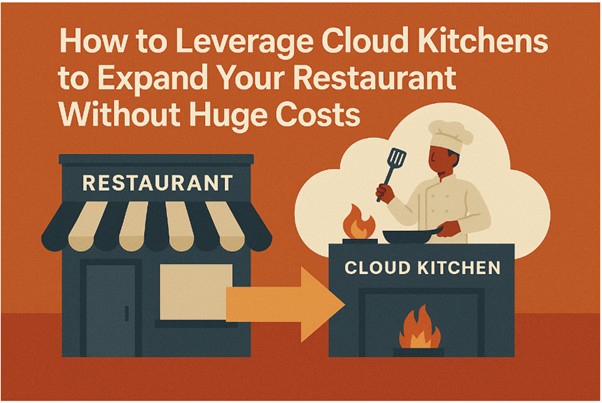
How to Leverage Cloud Kitchens to Expand Your Restaurant Without Huge Costs
Expanding a restaurant brand traditionally required a significant investment: finding prime locations, hiring front-of-house staff, managing interiors, and marketing to foot traffic. But the rise of cloud kitchens—delivery-only kitchens with no dine-in—has changed the game for growth-focused restaurateurs.
Chef Shajahan M Abdul, founder of Restro Consultants Pvt Ltd (RCPL), said, “Cloud kitchens give restaurants the power to grow fast and lean. It’s the future of smart expansion—especially in urban markets where rents are high and margins are tight.”
In this guide, we’ll show you
how to scale your restaurant brand using cloud kitchens without spending a lot
of capital.
What is a Cloud Kitchen?
A cloud kitchen (also known as
a ghost kitchen, virtual kitchen, or dark kitchen) is a commercial space
dedicated solely to fulfilling online orders. There is no dine-in or walk-in
service; orders come through apps like Swiggy, Zomato, or direct platforms.
Chef Abdul defines it: “Cloud
kitchens are backend operations for front-end brands.”
They are especially effective
for:
Why More Restaurants Are
Choosing Cloud Kitchens
1. Lower Capital Expenditure
You don’t need to invest in
seating, ambience, or a large staff. A basic cloud kitchen setup can cost up to
70% less than opening a full dine-in outlet.
2. Faster Launch Timelines
Cloud kitchens can be up and
running in a few weeks—there is no need for heavy interior design or licensing
delays.
3. Multi-Brand Capability
One cloud kitchen can house 3
to 5 brands—Indian, Chinese, Fast Food, or even Healthy Bowls—serving different
customer needs from the same kitchen.
4. Hyperlocal Reach
You can set up cloud kitchens
in multiple neighborhoods to cut delivery time and improve ratings on
aggregator platforms.
Restro Consultants Pvt Ltd
(RCPL) has helped dozens of restaurants launch cloud kitchens across India in
under 30 days, with break-even models achievable within 6–9 months.
How to Start a Cloud Kitchen:
Step-by-Step
Step 1: Decide on the Model
There are two main options:
Chef Shajahan M Abdul suggests
starting with a shared space to reduce fixed costs and focus on brand-building.
Step 2: Choose Your Concept(s)
Identify food concepts that
work well for delivery:
Restaurant consultants at RCPL
help map local demand, pricing, and packaging feasibility for each concept.
Step 3: Build Efficient Menus
Keep menus short, ingredient
overlap high, and prep times low.
Chef Abdul advises, “The best
cloud kitchen menus have 15–20 items, with 3–5 best-sellers driving 60% of the
sales.”
Step 4: Invest in Smart
Packaging
Your packaging is your brand
experience. It must:
Restro Consultants Pvt Ltd
(RCPL) partners with packaging vendors to offer custom branded solutions for
cloud kitchen clients.
Step 5: Set Up Aggregator &
Direct Sales Channels
List your brands on Swiggy and
Zomato and build a direct-ordering platform via WhatsApp, website, or
food-ordering plugins.
Restaurant consultants often
recommend running WhatsApp campaigns, CRM re-engagement, and Instagram ads to
shift customers from aggregators to direct orders (where margins are higher).
Step 6: Monitor Data &
Optimize
Use order data to:
Chef Shajahan M Abdul believes
cloud kitchens are a data goldmine. “Every order tells you what to cook more of
and what to retire. Use data, not guesswork.”
RCPL Cloud Kitchen Case Studies
Challenges to Watch Out For
Restro Consultants Pvt Ltd
(RCPL) addresses these issues with operations manuals, tech automation, and
staff training modules.
Is a Cloud Kitchen Expansion
Right for You?
Ask yourself:
If yes, cloud kitchens may be
your most brilliant next move.
Chef Abdul adds, “You don’t
need one crore to open your next location anymore. You need a chef, a kitchen,
and a strategy.”
Final Thoughts from Chef Shajahan
M Abdul
Cloud kitchens are more than a
pandemic trend—they’re a sustainable model for modern expansion. With low
overheads, fast scale potential, and the ability to test and pivot quickly,
they empower brands to grow intelligently.
As Chef Shajahan M Abdul puts it:
“If traditional restaurants are like storefronts, cloud kitchens are like
e-commerce. Leaner, faster, and built for growth.”
With expert help from
restaurant consultants at Restro Consultants Pvt Ltd (RCPL), you can design,
launch, and scale a profitable cloud kitchen network that takes your brand to
the next level—without massive costs.
Chef Abdul © Copyright 2024. All rights reserved.